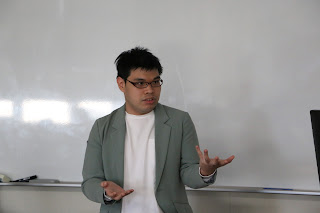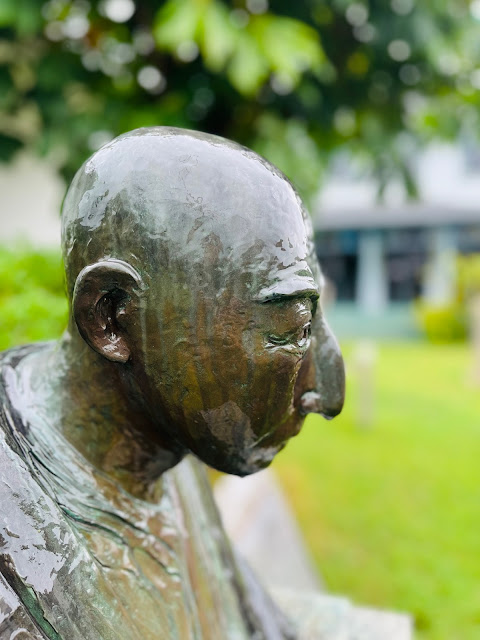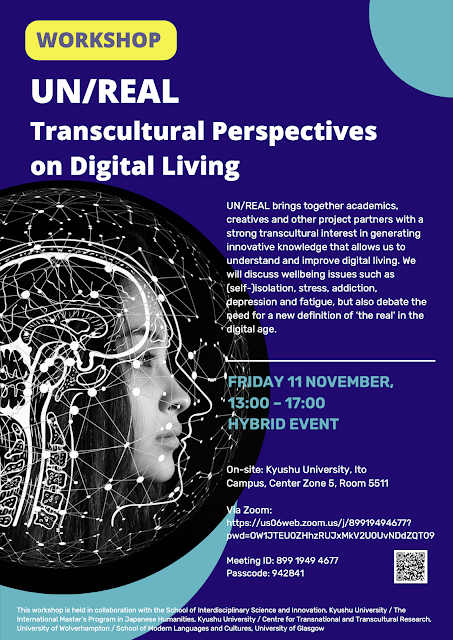On Friday 11 November, we had a very nice workshop on
'UN/REAL - Transcultural Perspectives on Digital Living'
with a fantastic lineup of seven speakers.
The workshop was an improvisation,
organized by Professor Bas Groes and his Ph.D. student Max Berghege,
in collaboration with many local partners,
and with funding from the Daiwa Foundation.
At Kyushu University, we organized a workshop as a part of the Lecture Series of the School of Interdisciplinary Science and Innovation; it also ran as a COIL trial in my (= Jan Lauwereyns's) Cognitive Science course. The workshop was organized in hybrid format at Ito Campus and online. Over 100 participants joined the workshop; 30 in person. The workshop was presented as a four-way collaboration between 1) the School of Interdisciplinary Science and Innovation, Kyushu University, 2) the International Master's Program in Japanese Humanities, Kyushu University, 3) the Centre for Transnational and Transcultural Research, the University of Wolverhampton, and 4) the School of Modern Languages and Cultures, the University of Glasgow. Brief opening remarks were given by Professor Kostas Kontis of the University of Glasgow, Dean of Global Engagement; I took the role of chair for the workshop.

The workshop started with a presentation by Dr Jon Keune from Michigan State University, who talked about "Allures of Solidarity: Ambedkarite, Japanese, and Taiwanese Buddhists Online and On the Ground"- three different Buddhist groups and how they employed strategic ambiguity to foster solidarity. Dr Keune's talk also included a video contribution by Ms Tereza Mensikova of Masary University (Czech) on "(Un)Real Digital Presentations of Dalit Activism: Case Study of Blog Platforms in India."

Mr Raditya Nuradi, a Ph.D. student in the IMAP program at Kyushu University, then took the floor to talk about "Spaces of Negotiation: Connecting Narratives and Constructing Realities in Anime Pilgrimage" - or how people share their love for fictional characters to the point of wanting to modify real spaces to look more like their images, even adding bus stop signs where there are no buses in real life, or what should we call that kind of life? Speakers and audience started realizing we were getting in trouble with that slippery word 'real'.

Our third speaker of the day was Mr Max Berghege, a Ph.D. student at the very end of his student days at the University of Wolverhampton, having submitted his thesis right before embarking on his journey to Japan. Max was the driving force behind this workshop, and he also delighted the audience with a fascinating talk "From Immersion to Aspersion: A Transcultural Rethinking of Virtual Reality and Imagining" - in which there was reference again to ambiguity, and layers of ambiguity and in-betweenness, like when you're being attacked by a virtual shark, while worrying about your unlocked bike, a crucial mistake in Amsterdam.
Speaker Number Four was none other than Kyushu University's very own composer in residence, the great expert on Japanese culture and esthetics, Dr Daryl Jamieson, one of the
seaweed gatherers, this time talking about "Creating Non-Fiction: Theory and Musical-Dramatic Practice" - with music as a shared object of listening, not language, but not not-language either, a shared sensory experience in or out of the hollow expanse of conventional reality, with even a brief nod to J.J. Gibson's ecological psychology (among references to Jo Kondo and Shizuteru Ueda). The composer then confessed to putting his ideas into practice, for instance, together with the poet and artist Miek Zwamborn and the playwright Graham Eatough.

The next speaker in our amazing lineup was Dr Ramona Fotiade from the University of Glasgow, giving a presentation on "Getting to Grips with Reality: Presence, Haunting and Technology in Jacques Derrida and Hitoshi Matsumoto" - on how cinema is an art of ghosts, where we can wake up to (un)reality, as in the movie Symbol, one of Matchan's craziest works (and Matchan's works are pretty crazy), revolving around some kind of deity in a white room with suspicious-looking knobs that allow him to intervene for better or worse in the life of say, Escargot Man, a Mexican pro wrestler.

Yours truly followed on with a flash talk, distributing "Thoughts on 間 for Natural-Born Cyborgs", arguing that we may be cyborgs alright, but there's nothing natural-born about it, we keep noticing at every turn how disembodied our extended cognition really is, to the point of developing such pandemic-related syndromes as Zoom fatigue; still, ever the optimist, I noted that the news was not all bad, we can in fact dive into the UN/REAL to explore and exploit new modes of creativity, metaphorically a type of electrical synapse, joint through gap junctions to be able to do things we never dreamed of before.
Our final speaker, the top of the bill, was Professor Thomas Kasulis, a REAL eminence in his field, who talked to us about "The UN/REAL in Japan: Reflections from a Western Philosopher". Tom headed straight for 間 and, with Tetsuro Watsuji, the aidagara, where the being human happens in the midst of in-betweenness, which, especially in Japan, is an in-betweenness with a multiplicity of layers, where the new does not push out the old, nor does the new blend with the old, we get a layering of reality with simultaneous incompatible views that somehow don't generate conflict in the way a Westerner might expect.
And of course we went overtime, not four hours, but four and a half.
But it was right like that.
It was amazing.
Or as Daryl would say (and did say): "It was a memorable experience, and I was pleasantly surprised by the synergies between presentations and presenters that at first glance had little in common."
Thank you, all.











